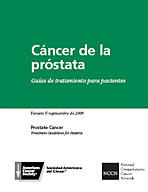May 9, 2007. — Scientists with the Lineberger Comprehensive Cancer Center at the University of North Carolina at Chapel Hill have for the first time implicated a growth-promoting cellular protein as one trigger of recurrence of advanced prostate cancer in men who are undergoing drug treatment to shut down their male hormones, or androgens.
The new research may help solve a mystery: why does prostate cancer recur in men treated to get rid of circulating androgens such as testosterone?
The new research "raises the exciting possibility that we can develop a specific drug against this," said senior study co-author Dr. Young Whang, associate professor of medicine at UNC-Chapel Hill.
The study appeared online May 9, 2007, in the Proceedings of the National Academy of Sciences. It is slated for print publication in the journal on May 15.
The protein, named Ack1, is a member of the tyrosine kinase gene family. Ack1 exerts its effect on the reemergence of the cancer by biochemically altering the now inactive androgen receptor in the nucleus of prostate of cells, according to a series of experiments conducted by lead author Dr. Nupam P. Mahajan, assistant professor of pharmacology, and other Lineberger scientists. The kinase activates the receptor via phosphorylation  by adding a phosphate group to this protein molecule.
"This biochemical action converts a prostate cell that would need an androgen signal for its growth to one that is independent of the androgen signal," said senior study co-author Dr. Shelton Earp, director of the cancer center, Lineberger professor of cancer research and professor of pharmacology and medicine.
Earp noted that until now scientists havenÂt completely understood what that conversion means. "Our experiments show that this heretofore understudied protein Ack1 may be crucial in at least a portion of these tumor recurrences. NupamÂs study nails down the mechanism by which that conversion happens."
Among the experiments were those that involved mice that were unable to produce androgen. The animals were implanted with human prostate tumor cells containing an activated form of Ack1. "We found that when prostate tumor cells express activated Ack1, cancer grew aggressively in these mice," Mahajan said. "This mimics what happens in patients undergoing hormone therapy."
The researchers noted that approximately one-third of androgen-independent human prostate tumors contain an activated Ack1 molecule. "The study is telling us this is a target for therapy and perhaps a very important target for therapy," Earp said.
Previously, in 2005, lab tests showed that Ack1 activity could be inhibited by an experimental drug called geldanamycin.
Other Carolina co-authors are Drs. Yuanbo Liu and Samarpan Majumder, Lineberger research associates; Maria E. Warren, molecular biology research associate; and Dr. Carol E. Parker, associate professor of biochemistry and biophysics. Dr. James L. Mohler, chairman of the department of urologic oncology at Roswell Park Cancer Institute in Buffalo, N.Y., and a UNC Lineberger member, also collaborated on the study.
Funding for the research came from the National Cancer Institute and the Elsa U. Pardee Foundation.
Sources & Links
Activated Cdc42-associated kinase Ack1 promotes prostate cancer progression via androgen receptor tyrosine phosphorylation Nupam P. Mahajan, Yuanbo Liu , Samarpan Majumder, Maria R. Warren , Carol E. Parker , James L. Mohler, H. Shelton Earp , and Young E. Whang. Lineberger Comprehensive Cancer Center, Departments of Pharmacology, Biochemistry and Biophysics, Medicine, and Pathology, University of North Carolina at Chapel Hill, Chapel Hill, NC 27599; and Department of Urologic Oncology, Roswell Park Cancer Institute, Buffalo, NY 14263 Proc. Natl. Acad. Sci. USA May 9, 2007.
Ack1 molecule stimulates the aggressive growth of prostate; in lab can be inhibited by geldanamycine cancer Dec 2005

 Pomegranate Juice Slows PSA Rise in men With Recurrent Prostate Cancer After Surgery, Radiation
Pomegranate Juice Slows PSA Rise in men With Recurrent Prostate Cancer After Surgery, Radiation


